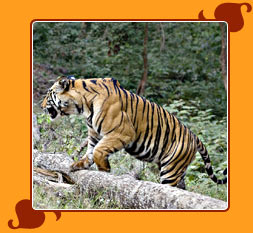Bandhavgarh is one of India's most picturesque
Central Indian jungles. A relatively new entrant to the Project Tiger
family, this forest has an ancient history, which is entwined with the Rewa
dynasty. Steeped in legend, these forests gave the world the progenitors of
all the white tigers alive today. Madhya Pradesh constitutes the very heart
of India.

The
vegetation in Bandhavgarh is varied and includes a blend of grasslands and
forests that support large herbivores, an impressive diversity of birds and
a host of insect life that has not yet been fully catalogued. This wildlife
haven is linked through patchy corridor forests with Kanha and together
constitutes one of the world's most important tiger-breeding habitats.
Madhya Pradesh is therefore justifiably proud of both reserves and calls
itself the "Tiger State" of India because over 20 per cent of all
the world's tigers are to be found here.
History
No one is really sure who built the Bandhavgarh Fort, which was
constructed on a virtually unassailable plateau at an elevation of 800 m,
though scores of myths about its origins continue to do the rounds. It is
clear, however, that the area now encompassed by the park has seen
settlements and civilisations come and go for millennia.
Historians
suggest that sandstone caves to the north of the Bandhavgarh fort harbour
Brahmi inscriptions dating back to the 1st Century B C. One of these caves,
called Bagdhalak, is embellished with the stripe patterns and pugmarks of
the tiger. Locals still venerate the cat and colourful tiger images can be
seen at scores of tiger temples, perhaps their way of appeasing the
awe-inspiring animal. Inscriptions attributed to King Bhimsen dating back to
300 AD have also been recorded from the fort walls. The Chandela dynasty of
Bundelkhand, most famous today for having built the Khajuraho temples (210
km away) also ruled here around the 12th century.
Later, warrior
clans fought and lost many battles for possession of the fort, until the
Baghels made the Bandhavgarh Fort their capital in the 17th century. The
house of Rewa, whose descendents still own the imposing fort, trace a direct
lineage from the Baghel dynasty and the fort is still owned by the Rewa
family. This is, in fact, the only private property legally recognised
within the National Park area and tourists can visit it after obtaining
permission. Today the fort is, however, run down and has been, ever since
the capital was shifted to Rewa 120 kms away. Till a few decades ago it
served as a hunting preserve for blue bloods, who took advantage of the fact
that the forest had reclaimed much of its once well-manicured estate.
Legand
It is believed that Lord Ram stopped here after vanquishing Ravana
in Lanka and that it was Hanuman's monkey architects, (who built the bridge
to Lanka) who designed and constructed the Bandhavgarh Fort. Lakshman, Ram's
obedient and dutiful brother, was gifted the fort, thus the name (Bandhav -
brother; garh - fort). People of the area still worship Lakshman at a temple
within the fort.
Places To See in BandhavgarhBandhavgarh
Fort: The Fort No records remain to show when Bandhavgarh Fort was
constructed. It is thought, however, to be some 2,000 years old, and there
are references to it in the ancient books, the Narad-Panch Ratra and the
Siva Purana. Various dynasties have ruled this fort: for example, the Maghas
from the 1st century AD, the Vakatakas from the 3rd century; the Sengars
from the 5th century and the Kalchuris from the 10th century
Baghel
Museum: Located only 100 metres from the resort, it houses certain
precious belongings of the Maharaja of Rewa who maintained Bandhavgarh as
his Shikargah, or a game preserve, a stuffed white Tiger still stands in the
museum amidst certain personal belongings of the Maharaja.






